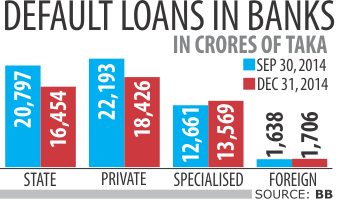Shahjalal Islami Bank Ltd.
 The Chairman of the Board of Directors of Shahjalal Islami Bank Ltd. and former president of FBCCI A. K. Azad formally inaugurated the relocated Banani Branch of the bank as Chief Guest recently. Among others Vice-Chairman of the Board of Directors Alhaj Mohammad Younus, Directors Alhaj Engineer Md. Towhidur Rahman, Alhaj Md. Sanaullah Shahid, Alhaj Khandoker Sakib Ahmed and Managing Director Farman R Chowdhury were present in the opening ceremony.
The Chairman of the Board of Directors of Shahjalal Islami Bank Ltd. and former president of FBCCI A. K. Azad formally inaugurated the relocated Banani Branch of the bank as Chief Guest recently. Among others Vice-Chairman of the Board of Directors Alhaj Mohammad Younus, Directors Alhaj Engineer Md. Towhidur Rahman, Alhaj Md. Sanaullah Shahid, Alhaj Khandoker Sakib Ahmed and Managing Director Farman R Chowdhury were present in the opening ceremony.
Head of Consumer Banking, Eastern Bank Ltd (EBL)

HSBC bank 'helped clients dodge millions in tax'
The banking giant admits failings
Banking giant HSBC helped wealthy clients across the world evade hundreds of millions of pounds worth of tax, the BBC has learned.
Panorama has seen accounts from 106,000 clients in 203 countries, leaked by a whistleblower in 2007.
The documents include details of almost 7,000 clients based in the UK.
HSBC admitted that some individuals took advantage of bank secrecy to hold undeclared accounts. But it said it has now "fundamentally changed".
The bank now faces criminal investigations in the US, France, Belgium and Argentina.
HSBC said it is "co-operating with relevant authorities". But in the UK, where the bank is based, no such action has been taken.
Offshore accounts are not illegal, but many people use them to hide cash from the tax authorities. And while tax avoidance is perfectly legal, deliberately hiding money to evade tax is not.
India's Finance Minister Arun Jaitley has said that all Indian names on the list will be investigated, although he cautioned that some accounts might be legitimate. A current inquiry looking into more than 600 people who hold accounts overseas, will now be widened to look into the current list of names.
The French authorities concluded in 2013 that 99.8 percent of their citizens on the list were probably evading tax.
The thousands of pages of data were obtained by the French newspaper Le Monde. In a joint investigation, the documents have now been passed to the International Consortium of Investigative Journalists, the Guardian newspaper, Panorama and more than 50 media outlets around the world.
The documents include details of almost 7,000 British clients - and many of the accounts were not declared to the taxman.,
HM Revenue and Customs (HMRC) was given the leaked data in 2010 and has identified 1,100 people who had not paid their taxes. But almost five years later, only one tax evader has been prosecuted.
HMRC said £135 million in tax, interest and penalties have now been paid by those who hid their assets in Switzerland.
But the chairwoman of the Public Accounts Committee, Margaret Hodge MP, said: "I just don't think the tax authorities have been strong enough, assertive enough, brave enough, tough enough in securing for the British taxpayer the monies that are due."
HSBC did not just turn a blind eye to tax evaders - in some cases it broke the law by actively helping its clients.
The bank gave one wealthy family a foreign credit card so they could withdraw their undeclared cash at cashpoints overseas.
HSBC also helped its tax-dodging clients stay ahead of the law.
When the European Savings Directive was introduced in 2005, the idea was that Swiss banks would take any tax owed from undeclared accounts and pass it to the taxman.
It was a tax designed to catch tax evaders. But instead of simply collecting the money, HSBC wrote to customers and offered them ways to get round the new tax.
HSBC denies that all these account holders were evading tax.
Richard Brooks, a former tax inspector and author of The Great Tax Robbery, said: "I think they were a tax avoidance and tax evasion service. I think that's what they were offering. They knew full well that people come to them to dodge their tax liabilities."
The man in charge of HSBC at the time, Stephen Green, was made a Conservative peer and appointed to the government.
Lord Green was made a minister eight months after HMRC had been given the leaked documents from his bank. He served as a minister of trade and investment until 2013.
He told Panorama: "As a matter of principle I will not comment on the business of HSBC past or present."
Treasury minister David Gauke defended Lord Green's appointment on BBC's Radio 4. "I am not aware of any evidence that suggests that Lord Green was involved in this sort of activity", but said he did not know whether anyone asked him about HSBC prior to his government appointment.
But Hodge said: "Either he didn't know and he was asleep at the wheel, or he did know and he was therefore involved in dodgy tax practices.
"Either way he was the man in charge and I think he has got really important questions to answer."
Meanwhile, HSBC said it has completely overhauled its private banking business and has reduced the number of Swiss accounts by almost 70 percent since 2007.
In a statement, the bank said: "HSBC has implemented numerous initiatives designed to prevent its banking services being used to evade taxes or launder money."
The bank said it now puts compliance and tax transparency ahead of profitability. But Panorama has spoken to a whistleblower who said there were still problems with tax dodging at HSBC private bank when she worked there in 2013.
News:The Daily Star/10-Feb-2015
StanChart targets wealthier customers in retail bank revamp
Standard Chartered Plc will shift its retail banking focus to affluent clients from ordinary customers and urge them to bank online as part of a broader restructuring led by embattled CEO Peter Sands, a senior executive told Reuters.StanChart's retail business is one of the first divisions the Asia-focused lender has targeted with cuts, announcing last month it would axe 4,000 retail jobs or 5 percent of its global workforce and close 80-100 branches.
The costs cuts and the shift to wealthy clients in Asia, the Middle East and Africa come as Sands, who some investors would like to see replaced, is under increasing pressure to revive the bank's fortunes after a troubled two years.
"We're steering away from clients who just want a personal loan to those who'll buy multiple products," Karen Fawcett, global head of retail clients at StanChart, told Reuters in an interview on Monday.
The bank's retail division contributes 30 percent of its revenues. Affluent and business customers represent just one fifth of its 10.4 million retail clients but account for about half of the division's profits.
Revenues from those clients have grown by 10 percent in recent years, compared with zero growth for revenue from less wealthy customers, Fawcett said.
Amid calls from some of the lender's top investors to stand down, Sky News reported on Friday that Sands had told senior staff on an internal conference call last week that succession planning has already begun.
Fawcett said she had not been present on the call. "Peter is a very competent chief executive and he is running the bank," she said.
On the impact of cost cuts, Fawcett said she was aiming to reduce the division's cost-income ratio from 67 percent to 65 percent by the end of the year, and ultimately to 55 percent.
By comparison, HSBC Holdings had a cost efficiency ratio of 64.5 percent for its retail division, according to its 2013 annual report.
In addition to previously announced closures in South Korea, the bank has closed many branches in Pakistan. Most other markets will also see a few closures, Fawcett said, adding that some branches will be relocated.
Another key time-saving initiative will be the rollout of an iPad-based platform for recruiting new clients in 10 markets this year and another 10 markets in 2016, she said.
StanChart's Hong Kong shares ended down 1.4 percent. They have lost more than a third of their value in the past 12 months.
News:The Daily Star/10-Feb-2015
Banks' soured loans finally shrink

Banks' default loans dropped 12.45 percent in the last quarter of 2014 after rising in the three previous quarters, much to the relief of the central bank.
On December 31 last year, the banking sector's bad loans stood at Tk 50,155 crore or 9.69 percent of its total lending.
In contrast, on September 30, the sector's bad loans were Tk 57,291 crore or 12.6 percent of the total outstanding loans.
The sector started the year with Tk 40,583 crore of bad loans, which then rose to Tk 48,172 crore in the first quarter, Tk 51,345 crore in the second quarter and further more the following quarter.
The upward trend prompted the central bank towards the end of last year to direct the banks to take strong measures to address the situation.
Subsequently, banks went on strong recovery drives in the last quarter and also conducted rescheduling and write-offs, Bangladesh Bank Deputy Governor SK Sur Chowdhury said.
The banks realised Tk 3,064 crore in the fourth quarter of 2014, which is up almost 45 percent over the previous quarter.
The central bank too had a part in the drop in classified loans: it intensified its monitoring of the banks' default loan situation, pushed banks to pay more attention to realising loans and put pressure on them to create a good lending culture in the country, Chowdhury said.
“Plus, the political situation was calm last year, so the businessmen could pay the loans on time.”
Between September and December, the bad loans of the four state-owned commercial banks plummeted 20.88 percent and private banks 16.97 percent.
The five specialised banks though saw their bad loans swell 7.17 percent during the period. The foreign banks' bad loans too increased, by 4.15 percent.
The central bank, in a statement, tipped the classified loans to shrink further in the coming quarters once the large loan restructuring policy comes into effect
News:The Daily Star/10-Feb-2015



